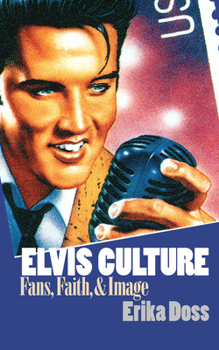Elvis Culture: Fans, Faith, and Image
(Part of the CultureAmerica Series)
Select Format
Select Condition 
Book Overview
It doesn't matter how you remember him--rockabilly rebel, all-American boy, B-movie idol, patriotic G.I., or Las Vegas superstar. Elvis Presley is the most enduring image in American popular culture. This book explains why. Other authors have explored Elvis's life and music, but Erika Doss now examines his multifaceted image as the key to understanding the adulation that has survived his death. She has talked with fans and joined their clubs, studied their creations and made pilgrimages to Graceland, all to explore what these images mean to those who gaze upon them, make them, and collect them. In researching Elvis Culture , Doss discovered that the visual image of Elvis endures because it was so carefully constructed from the start. Sifting through the visual glut of Elvisiana, she looks at how fans collect, arrange, and display Elvis paraphernalia, make Elvis artwork, and participate in the annual August rituals of Elvis Week. By engaging in these acts, she explains, they continually reinvent Elvis to mesh with their own personal and social preferences and to keep his memory alive. Doss examines Elvis in specific contexts: as a religious icon honored in household shrines, as a focus of sexual fantasy for women and men (both straight and gay), as an inspiration for countless impersonators, and as an emblem of whiteness held in disdain by many blacks--despite his having crossed racial lines with his music. She also looks at how Elvis has become a sanitized, legally protected image controlled by Elvis Presley Enterprises, Inc., which bans the sale of black velvet paintings and licenses his likeness around the world. As engrossing as it is informative, Elvis Culture strikingly demonstrates the power of pictures in our visual culture and reveals much about American attitudes toward religion, sex, race, and celebrity--as well as about the construction of American identity in the late twentieth century.
Format:Paperback
Language:English
ISBN:0700613374
ISBN13:9780700613373
Release Date:April 1999
Publisher:University Press of Kansas
Length:289 Pages
Weight:0.95 lbs.
Dimensions:0.6" x 5.8" x 9.3"
Customer Reviews
3 ratings
Iconic Status
Published by Thriftbooks.com User , 22 years ago
The cover of Erika Doss's invaluable guide to how one itty bitty rock legend became the inimitable, unquestionable image he is today tells it all. Elvis on a stamp, on envelopes and mail sent daily throughout the United States? Yep, he's not just a singer anymore, as Doss points out in her exhaustive search for the how's and why's of Elvis's rise to status of cultural icon, to the imagistic equivalent of Jesus on the cross. Elvis is, in fact, more than just an image too, she points out; he's a corporation.Doss's book was a revelation of sorts, close to the epiphany she recounts earlier on, realizing that people have come to worship Elvis as wholeheartedly as they do any god or cult leader. Doss also examines the elements of our own culture, which pave the way for such a dramatic recreation of image in this age of media saturation. She talks about the tight rein Priscilla Presley and Elvis Presley Enterprises have kept on what they will allow his image and name to grace. Also outlining the myths involved in such a recreation, Doss shows us just how much we can trust the products and decisions of corporations whose inherent goal is pretty apparent: more and more profit._Elvis Culture_ also acknowledges the fans, perhaps the true creators of the Elvis image. Doss tells us about "Graceland Too" whose owner is devoted to the collecting of "Elvis stuff." She profiles an artist who channels her love for Elvis into sometimes room-size installations of kitschy devotion to the King, and another woman who has made (and charges no admission to see) a very miniature version of Presley's Memphis mansion. Nowhere in the book, however, does Erika Doss ignore what such behavior suggests about us as a society. Whether we take the Graceland tour and support a multi-million dollar company committed to supposedly "preserving" the Presley name, or trust the fans to the more pure, downhome maintenance of Elvis's image,we must acknowledge that all of these people involved in Elvis culture are products of American society. Submission to the corporation exemplifies our culture's handing itself over to the Starbuck's and Wal-marts of the world, and the fans' collection perhaps even further shows America's servitude to a relentless materialism. Doss knows this, and she does a great job examining all of the different aspects of culture Elvis Presley and his image have invaded, and even more importantly perhaps, why we have let them.
The definitive word on Elvis fan-dom
Published by Thriftbooks.com User , 25 years ago
Doss's book is full of pleasure even as it takes on the question of Elvis's significance as a sort of secular religious figure. Doss interviewed and questionnaired hundreds or maybe thousands of hardcore fans, and she's listened carefully to them. The result is a work that's a pleasure to read and revelatory of contemporary life at the same time. If you wonder what's going on with American culture at the end of the millennium, Doss will give you some real insights.
Every Look-alike should buy this work--
Published by Thriftbooks.com User , 25 years ago
Compares to ,but reads better than the '94 title: "Impersonating Elvis", the legacy of whom leads one to believe his mansion"Graceland"..has a revolving door...






